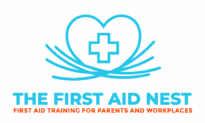Dealing with Delicate Tummies: Essential First Aid for Children with Food Poisoning and Sickness Bugs

Children are particularly vulnerable to food poisoning and sickness bugs due to their developing immune systems and frequent exposure to pathogens in various environments.
Food poisoning, caused by contaminated food or water, and sickness bugs, often viral in nature, can lead to discomfort and distress in children, as well as potentially serious complications if left untreated. Therefore, it is essential for parents, caregivers, and anyone involved in the care of children to be well-informed about these conditions and equipped with essential first aid knowledge to effectively manage them.
Understanding how to recognize symptoms, provide immediate care, and prevent further complications is crucial for ensuring the health and well-being of children during episodes of food poisoning and sickness bugs. With proper awareness and preparedness, caregivers can mitigate the impact of these illnesses on children and facilitate a smoother recovery process.
Understanding Food Poisoning and Sickness Bugs in Children:

Food poisoning and sickness bugs pose significant health risks to children, impacting their well-being and potentially leading to serious complications. Food poisoning typically results from the ingestion of contaminated food or water, while sickness bugs, often caused by viruses like norovirus, spread through person-to-person contact or contaminated surfaces.
Factors contributing to children’s vulnerability include their immature immune systems, which may struggle to fight off infections effectively, as well as their tendency to explore and put objects in their mouths, increasing the risk of ingesting harmful pathogens.
Common pathogens responsible for food poisoning and sickness bugs in children include bacteria such as Salmonella, Escherichia coli (E. coli), and Campylobacter, as well as viruses like norovirus and rotavirus. These pathogens can cause gastrointestinal symptoms such as nausea, vomiting, diarrhoea, and abdominal pain, posing challenges for parents and caregivers in managing their children’s health during such episodes.
Recognizing Symptoms in Children:

Gastrointestinal Symptoms:
- Nausea, vomiting, diarrhoea, and abdominal pain are common indicators of food poisoning and sickness bugs in children.
- These symptoms may manifest suddenly after consuming contaminated food or coming into contact with pathogens.
Other Specific Symptoms:
- Children may exhibit symptoms such as irritability, lethargy, and decreased appetite, signaling underlying illness.
- Changes in behavior or mood can provide valuable clues about a child’s health status.
Signs of Severe Illness:
- High fever, dehydration, persistent vomiting or diarrhoea, lethargy to the point of being difficult to wake, or significant changes in mental status indicate severe illness in children.
- Caregivers should trust their instincts and seek immediate medical attention when these signs are present to ensure the well-being of their children.
Essential First Aid Measures for Children:

A. Hydration
- Fluids are crucial for children to prevent dehydration during illness.
- Oral rehydration solutions like Hydralyte or Dioralyte are suitable for children to restore electrolyte balance.
B. Rest and Comfort
- Ensure children get adequate rest to facilitate recovery.
- Comfort sick children through activities like cuddling or storytelling to alleviate discomfort.
C. Dietary Considerations
- Offer bland and easily digestible foods like bananas, rice, applesauce, and toast during illness.
- Avoid spicy, greasy, or dairy-rich foods that may worsen symptoms.
D. Over-the-Counter Medications
- Safe antipyretics like paracetamol or ibuprofen can be used to reduce fever in children.
- Use medications cautiously and consult a healthcare professional, especially for children, to avoid adverse effects or interactions.
Home Remedies and Care Tips for Children:

A. Clear Liquids and Electrolytes
- Importance of offering clear liquids to children for hydration.
- Homemade electrolyte solutions can be made using water, salt, sugar, and citrus juice as alternatives to commercial oral rehydration solutions.
B. Bland Diet for Children
- A bland diet may consist of bananas, rice, applesauce, and toast, suitable for children’s delicate tummies during illness.
- Benefits of a bland diet include soothing the stomach, absorbing excess fluids, and providing necessary nutrients without exacerbating gastrointestinal symptoms.
C. Probiotics for Children
- Introduction to child-friendly probiotic sources such as yogurt, kefir, or probiotic supplements.
- Importance of probiotics in supporting children’s digestive health by replenishing beneficial bacteria in the gut, promoting overall digestion, and boosting immune function.
Want more? We’ve got you covered…
Our Baby First Aid Courses
Our baby first aid courses are available in person in your home and online. We run classes in your home with groups of 2, 4 or up to 10 in Sydney & Melbourne and you can book in 3 easy steps!
- Pick your class
- Follow the prompts to purchase
- We will contact you within 24 hours to lock in your date of choice
Our First Aid Certificate Courses
We run most of the popular first aid courses Australia wide. HLTAID011 Provide First Aid, HLTAID009 Provide CPR, HLTAID012 Provide First Aid in an Education & Care Setting, RAMOAP (anaphylaxis), Mental Health first aid and CPR/LVR to name a few.
Book your public spot online or contact us if you have a group of 5+ people for onsite training.
Here are some other resources you may enjoy!
FREE GUIDE: Your Virtual Baby First Aid Kit
FREE GUIDE: Introducing Common Allergy Foods & Allergic Reactions
FREE Workplace Emergency Preparedness Plan: Grab this at the bottom of every page!
Follow for baby & child first aid and allergy info and tips on Instagram, TikTok & Facebook all @thenestcpr
